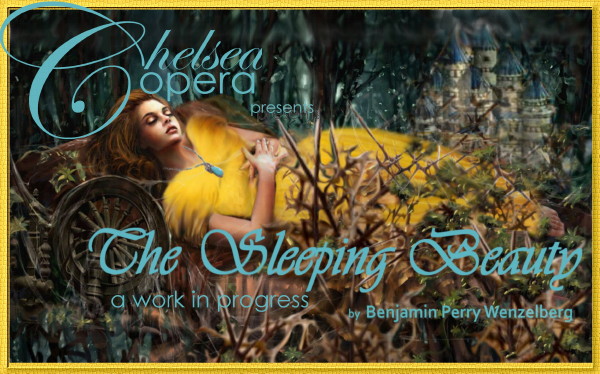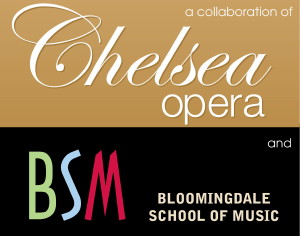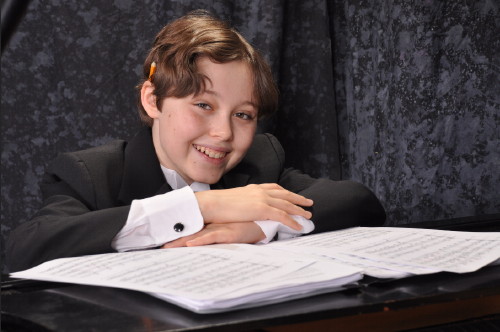 |
 |
|||||||||||||||||||||||||||||||||||||
 |
|
|
||||||||||||||||||||||||||||||||||||
Opera Lab: The Sleeping Beauty - a work in progress
by Benjamin Perry Wenzelberg  |
||||||||||||||||||||||||||||||||||||||
|
||||||||||||||||||||||||||||||||||||||
January 17, 2014 at 7:30pm Free -Donations accepted |
||||||||||||||||||||||||||||||||||||||
| Meet the cast | ||||||||||||||||||||||||||||||||||||||
| with the Bloomingdale School of Music Orchestra and members of the Chelsea Opera Chamber Orchestra | ||||||||||||||||||||||||||||||||||||||
 |
||||||||||||||||||||||||||||||||||||||
INTERVIEWS WITH THE COMPOSER
Choosing the voices Orchestrating The Sleeping Beauty ten years from now target audience of The Sleeping Beauty inspirations and composing the idea of a fairy tale opera the majestic frog conducting The Sleeping Beauty styling the music of The Sleeping Beauty musical influences thank you and looking forward |
||||||||||||||||||||||||||||||||||||||
| More About | ||||||||||||||||||||||||||||||||||||||
| The Sleeping Beauty | ||||||||||||||||||||||||||||||||||||||
A note from the Composer - Benjamin Perry Wenzelberg I’m so happy to have this opportunity to share my opera, The Sleeping Beauty, with you! I’d like to thank Lee, Lynne, and the rest of the Chelsea Opera family for giving me this special honor and privilege— from reading about Nicholas S. Priore, I’ve learned about his remarkable life and what an amazing man he was. His shoes are hard ones to fill, but I will try my best, and look forward to the exciting year ahead! The Sleeping Beauty is a story that holds a special place in my heart. Ever since I was really young, I’ve loved the magic, romance, and heroism that comes out of the story. But it was only recently that I discovered the Grimms’ version. Since I’ve seen the Disney version many times, I did not think the Grimms’ would be any different. Little did I know… For example, in the Grimms’ version, the curse isn’t broken by a prince’s kiss. It only breaks by a 100-year sleep, and a prince happens to awaken her on the same day. I thought it was too coincidental. I also added some story elements from Tchaikovsky’s ballet: for instance, the Last Wise Woman escorting the Prince to the Princess’ castle after he gets lost on a hunting excursion. I’m getting ahead of myself. I’d like to explain why I decided to write this opera in the first place. I have been composing since I was very young, and when I began to sing at the Metropolitan Opera, the music invigorated me. I wanted to create music like that. I said to myself, “I’m going to write an opera.” Knowing about sad endings to operas, I wanted a happy ending. The next thought was “fairy tales.” Originally, “Alice and Wonderland” was going to be it; but a lot of movies and musicals surfaced then, so I put that aside. However, I remembered my old favorite, “The Sleeping Beauty,” and I got right to work. In writing The Sleeping Beauty, I tried to make the libretto and music as dependant on each other as much as possible. I thought about characters’ motivations, personalities, and actions. For example, the role of Rosamond (the Sleeping Beauty) is an innocent, bubbly teenager. I decided to make her a coloratura soprano, with exciting runs and trills. Her words are bright and young, as opposed to the King and Queen, who take on a more parental approach. However, they have their own share of “young” music. The Queen is a lyric soprano, but I wanted to express her youth at the beginning of the opera by inserting some coloratura runs. Of course, vocal genetics made the coloratura pass on to Rosamond. In this way, I constructed the fundamentals of my music. In terms of libretto versus music, I wrote the libretto section by section, and the music in the same way, simultaneously. Sometimes, I’d have a passage where I would like the way the words flowed, and I’d just keep writing the words. Other times, the same would happen with the music, and I’d have to backtrack to accommodate the other. I’m very excited about this project, and the fact that I will have the opportunity to conduct my very first opera. Having the chance to lead the singers and orchestra in a live situation is a wonderful chance to have full responsibility of making the music. This opera is my case of diamonds. I’ve written the libretto, music; everything has been done by myself, and conducting the opera is the final stage of my solo undertaking. I am really honored to be the first recipient of the Nicholas S. Priore New Possibilities Fund, and to have Chelsea Opera present the world premiere of The Sleeping Beauty. This opera is my baby, my pride and joy; I’ve written every word, every note, every stage direction, start to finish, by myself. I’ve dreamt of this for a long time, and I hope that I will get to speak to everyone who wants to know more about the opera or has any questions. I hope that by introducing this opera to children and families, they will be exposed to opera early on, and fall in love with it, as I have. Thank you Chelsea Opera, my teachers, my family, my friends, and everyone who has watched The Sleeping Beauty take shape. I look forward to sharing my opera with all of you! |
||||||||||||||||||||||||||||||||||||||
Benjamin P. Wenzelberg (treble) (short bio) has performed with Chelsea Opera in the title role of "Amahl and the Night Visitors" in 2009 and in numerous concerts since that debut. Heperformed the role of Miles in “The Turn of the Scew” with Opera Moderne at Symphony Space this past May. Other recent roles include: Charlie Bucket in the original opera, “The Golden Ticket” (Atlanta Opera and recording), Amahl in Amahl and the Night Visitors at Avery Fisher Hall (The Little Orchestra Society), vocal soloist and performer in Shakespeare in the Park’s “Measure for Measure” (Delacorte Theater), and Youth soloist in Mendelssohn’s Elijah, NY Philharmonic conducted by Alan Gilbert at Avery Fisher Hall. Benjy performs regularly with The Metropolitan Opera Children’s Chorus and has covered many roles there including 1st and 2nd spirit (Die Zauberflote), and Yniold (Pelleas and Melisande). Composition and conducting major: Juilliard School Pre-College; classical and jazz piano scholarship student at the 92 nd St. Y School of Music.
|
||||||||||||||||||||||||||||||||||||||
Benjamin P. Wenzelberg (treble) (long bio) is a frequent performer in Chelsea Opera’s concerts and productions, and is proud to be performing once again with them this November in Benjamin Britten’s Canticle II as Isaac in Abraham and Isaac. This month, he will also be performing musical selections from “Jesse James Dead or Alive,” and will be performing a song cycle he wrote for a performance at the Juilliard School. Benjy looks forward to performing the role of Hansel in excerpts from Hansel and Gretel with Dicapo Opera, as well as singing excerpts from Amahl and the Night Visitors with them and at Kyrenia Opera’s Inaugural Gala in December. F avorite roles includeperforming the role of Miles in The “Turn of the Screw” at Symphony Space, NYC with Opera Moderne for which the NY Times stated, “ Benjamin P. Wenzelberg, a boy treble, sang with intensity and focus, keenly enacting Miles’s knife-edge balance as victim and villain;” performing the role of Charlie Bucket in Peter Ash’s original opera, “The Golden Ticket,” based on Roald Dahl’s Charlie and the Chocolate factory at Atlanta Opera where his performances were recorded live for a CD release this December; performing the role of Amahl in “Amahl & the Night Visitors” at Avery Fisher with the Little Orchestra Society as well as having previously performed this role with Chelsea Opera; working with Alan Gilbert and the NY Philharmonic as a soloist in Mendelssohn’s “Elijah” at Avery Fisher Hall; portraying the characters of four different boys at the 92 nd St. Y’s Kaufmann Concert Hall in their Terezin outreach performances about the boys of Terezin ; singing the role of “Boy” in the Shakespeare Theater Company of Washington, D.C.’s “Wallenstein” reading in NYC after having the opportunity to be a featured performer/vocal soloist in “Measure for Measure” at Shakespeare in the Park’s Delacorte Theater with the Public Theater (recording available) . He was a soloist at the US Open’s Men’s’ Quarter Final at Arthur Ashe Stadium in Flushing Meadow, and was proud and honored to be invited to sing in Jerusalem, Israel at two “Restoring Courage” events; he was also excited to have met Mayor Bloomberg after performing for his Education Nation forum this September. He is a proud member of the Metropolitan Opera Children’s Chorus, now in his fourth season, having covered many solo roles there including Yniold in Pelleas and Melisande (Sir Simon Rattle) and First and Second Spirit in Magic Flute (German and English); he has also performed in the chorus of many operas at the MET including Carmen (HD/DVD), Tosca (HD/DVD), Hansel and Gretel, Boris Godunov (HD), Queen of Spades, La Boheme, Billy Budd and currently Otello (HD). Additional favorite projects include covering the role of Arthur in Stephen Schwartz’s first opera, “Séance on A Wet Afternoon” at NY City Opera; soloist in NY City Opera’s VOX performance of “Mary Shelley;” covering the boy soprano solo in Chichester Psalms at NY City Opera; performing the role of Colin in “The Secret Garden” in two different productions; performing at Live at Lincoln Center with Ronan Tynan; singing the title role in an original opera composed by friend Glen Roven, “Anderson’s Solo;” and performing Glen’s “Goodnight Moon” composition with Lauren Flannigan as well as a part of his soon to be released CD with Catherine Zeta-Jones and Michael Douglas. Benjy studies composition and conducting at Juilliard Pre-College. He is also very excited to have just been accepted into the NY Youth Symphony Apprentice Conducting Program. He is honored to be a Recanati-Kaplan Scholar at the 92 nd St. Y School of Music studying classical and jazz piano and jazz ensemble and is a merit bond recipient for 2011 and 2012. He has just received First Class Honors with Distinction for his Classical Piano and music training as well as in theory in the Carnegie Hall Royal Conservatory Achievement tests. He is proud to have received several awards for his compositions. In addition to piano, Benjy plays the violin, clarinet and harpsichord, and made his conducting debut at 11 years old conducting the Opera Children’s chorus in a selection from Mozart’s “The Magic Flute” at the Crested Butte Performing Arts Center in Colorado as part of the Crested Butte Music Festival. He was then honored to have been asked by Chelsea Opera to conduct the Mikado’s, “The Flowers that Bloom in the Spring” as their concert finale this past March. He is thrilled to be currently working towards a presentation of the first opera he’s composed “The Sleeping Beauty” and hopes to conduct it one day. Thank you to everyone who has supported, inspired, and believed in me -- special thanks to Lynne, Lee, Amelia, Glen, Tony, Rebecca, Larry, Joe, Richard, Russell, David, Mr. Ewazen, everyone at the 92 nd St. Y, Juilliard Pre-College, TMS, and all my teachers, family and friends. |
||||||||||||||||||||||||||||||||||||||
Synopsis Act 1 Scene 2: The next scene is ten months later. The Queen has given birth to the child, and a celebration is taking place at the castle. The chorus sings, dances, eats, and drinks, and all is well. Amidst the joyous celebrating, the Wise Woman present their gifts to the child. The Last Wise Woman, however, cannot present her gift: the chorus sings again and the celebrating continues. But suddenly, the Evil Wise Woman bursts in, furious and burning with revenge. She was not invited to the party (for obvious reasons) and decides to bring a “present” of her own. She curses the child, saying that she will live to be fifteen years old, and then she will prick her finger on a spindle and die. The King declares that all spindles in the land shall be banished, and then breaks down. He and the Queen are heartbroken to have their new greatest joy taken away after only fifteen years. The Queen realizes that the Last Wise Woman hasn’t presented her gift, and has the power to save the child. The Last Wise Woman says she “will do what [she] can do,” and changes the spell so that the spindle will result in a one hundred year sleep. The King, Queen, Last Wise Woman, and chorus sing good luck to the baby Rosamond. Scene 3: The final scene of Act 1 is fifteen years later, at the Gate of the castle. The King and Queen are off to sign a peace treaty with a kingdom that is now on peaceful terms with them. The now fifteen-year-old Rosamond enters, innocently beautiful. She bids them farewell on their journey. Now alone, she examines a trinket that a loving prince gave her, but she dismissed him. She sings of how one day she’ll find her true love, and she’ll become Queen and rule forever with her love. As she wanders the castle, she comes upon a strange old door. She turns the key and goes inside. The Evil Wise Woman disguised as an old woman is spinning flax on a spindle. As spindles had been banished from the kingdom, Rosamond never had seen one, and didn’t know the reason it was banished. Unsuspecting, she tries spinning flax, and the prophecy is fulfilled: she pricks her finger, and falls back on a bed that was put there. The Evil Wise Woman sheds her disguise and flies away, laughing maliciously. All the servants of the castle, the King and the Queen, and all of the animals collapse in a deep sleep. A hedge of thorns grows all around the castle until it is barely visible. The skies turn dark as the curtain falls. Act 2 ( further detail to follow) A tavern. A couple of local men are drinking and being merry. The Prince’s horns are heard, and moments later, he rides in on a horse. Stating that he stopped for a rest on a hunting trip, he sits and takes a cup of wine. The Old Man enters, in a haunted stupor. He sings that his son is dead because of a princess and “the thorns.” The Prince, eager for a princess, asks the Old Man to tell of him of the princess and his son. The Old Man repeats the story, stating in addition that many a prince, like his son, tried to save the princess, “only to die a lamentable death in the thorns.” The Prince declares his love for the princess, and says that he will go and save her. The Old Man tries to dissuade him, telling him that his life will end like the Old Man’s son. The Prince attempts to leave, but the Old Man draws his sword and says that the Prince will leave over his dead body. The Prince fights him and wounds (or kills?) him. He ends up finding the castle with the help of the Last Wise Woman’s spirit and the thorns turn into flowers after his deadly battle with the Evil Wise Woman. He finds the princess and kisses her awake. They are now together, and they become King and Queen as the curtain falls. |
||||||||||||||||||||||||||||||||||||||
The Sleeping Beauty Music and Libretto by Benjamin Perry Wenzelberg Cast Rosamond……………High Soprano (Coloratura) Vocal Range: Middle C – High C The Prince……………High Tenor (Coloratura/Dramatic) Vocal Range (approx.): D below Middle C – High Bb (opt. High D) The Queen…………….Soprano (Lyric with some Coloratura passages) Vocal Range: A below Middle C – High B The King…………….Baritone - Vocal Range: B below Bass C – G above Middle C Old Man……………Bass-Baritone - Vocal Range: G below Bass C (opt. E below Bass C) – E above Middle C (Falsetto) The Evil Wise Woman……Soprano (Dramatic) Vocal Range: E above Middle C – High C With S.A.T.B. Chorus |
||||||||||||||||||||||||||||||||||||||
Orchestration 2 Flutes (doubling Piccolo and Alto flute)
|
||||||||||||||||||||||||||||||||||||||
| In Tribute to Benjamin Perry Wenzelberg They said it couldn't be done, they said it couldn't be done, That all those who tried were ruing it. Doesn't that prove it couldn't be done? But wait! That kid over there's doing it! Best wishes, Seymour Barab, composer |
||||||||||||||||||||||||||||||||||||||
|
||||||||||||||||||||||||||||||||||||||
|
||||||||||||||||||||||||||||||||||||||







